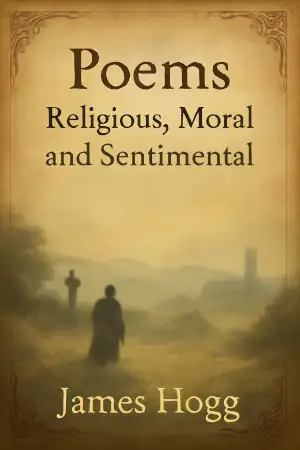Poems: Religious, Moral and Sentimental

Buy the Book
Book Description
First published in 1825, Poems: Religious, Moral and Sentimental presents a unique collection of sixty-seven poems by the poet James Hogg, known for his connection to the pastoral traditions of 19th-century Ireland. This volume is divided into two main sections: religious poems and those of a more moral and sentimental nature. Though now regarded as a work of historical curiosity, it was highly regarded in its time and may have been the first volume of poetry published in New Brunswick.
Hogg’s writing spans a rich variety of poetic styles, including ballads, narrative verse, lyrics, elegies, odes, and pastoral poetry. While the majority of the poems are lyrical in nature, they often reflect his experiences and the pastoral life he led in Ireland. His work evokes the natural world with vivid imagery, capturing the beauty and simplicity of rural life.
Notable among the collection is “The Hermit of Woodford,” a narrative poem steeped in medieval romance, reminiscent of the storytelling style of Sir Walter Scott. Hogg also explores themes of love, dreams, and the complexity of the human heart through his lyrical works, often imitative in nature but nonetheless captivating in sentiment.
Though much of Hogg’s work today may be of more historical interest, his poems were considered far above the ordinary in their time, offering a window into the poetic world of early 19th-century Ireland. For readers seeking to explore the poetry of this lesser-known Hogg—sometimes confused with his distant relative, the famous “Ettrick Shepherd”—this volume offers a glimpse into a forgotten literary tradition.
Note from Leitrim Books
This volume has been meticulously prepared from a digital transcription of the original 1825 edition published by Henry Chubb in Saint John. Every effort has been made to preserve the integrity of the source text, including its original orthography and punctuation, allowing the reader to experience the work as it was first presented.
The typography has been carefully selected to recall the character of early nineteenth-century printing, paying homage to the material feel of the first edition without sacrificing clarity. While composed using contemporary digital methods, the aim has been to produce a volume that is at once a faithful historical document and a highly readable modern edition.

 Amazon.com (US)
Amazon.com (US) Amazon.ie (Ireland)
Amazon.ie (Ireland) Amazon.co.uk (UK)
Amazon.co.uk (UK) Amazon.ca (Canada)
Amazon.ca (Canada) Amazon.com.au (Australia)
Amazon.com.au (Australia) Amazon.de (Germany)
Amazon.de (Germany) Amazon.fr (France)
Amazon.fr (France) Amazon.es (Spain)
Amazon.es (Spain) Amazon.it (Italy)
Amazon.it (Italy) Amazon.nl (Netherlands)
Amazon.nl (Netherlands) Amazon.pl (Poland)
Amazon.pl (Poland) Amazon.se (Sweden)
Amazon.se (Sweden) Amazon.com.be (Belgium)
Amazon.com.be (Belgium) Amazon.co.jp (Japan)
Amazon.co.jp (Japan)